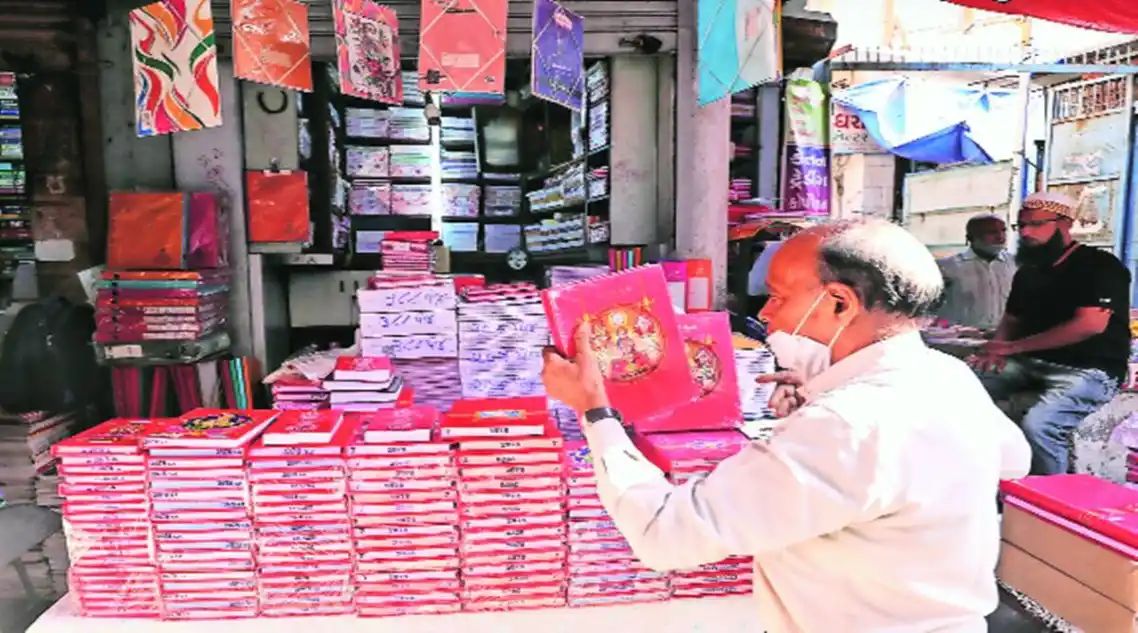In a secluded corner of a godown in a walled city neighborhood of Ahmedabad, Ahmed Barkat (64) rests his hand on an elongated red book as he gives it the final touches.
The chopda or bahi-khata, as these account books are called, are being readied for businessman to perform “chopda pujan” on Diwali, now mostly used symbolically, after most offices computerised their account-keeping and sales of these ledgers went down my almost half.
In Hindu tradition, Diwali is considered to be the last day of the financial year. All business accounts of previous year are closed before this puja.
On Diwali, businessmen perform puja on their account books and keep them ready for the beginning of the next Hindu year that begins on Labh Pancham which is five days after Diwali.
This age-old tradition of worshipping the account books is a form of “Muhurta” Puja for the businessmen, which signifies beginning of a new year.
Barkat is among 1000-odd Muslim families in walled-city area of Ahmedabad who still make these account ledgers for the local businessmen.
“I have been making these books for the last 40-45 years. Only members of Muslim families are involved in this work. It is hard labour to manually fold the pages of these books and to bind them together,” says Barkat who is the last member of this family engaged in making these books. “We used to make 250 books a day in the past, now these numbers barely touch 100 a day. It depends on the orders that come in. We start making these books five months ahead of Diwali,” he said.
Naresh Shah, president of Kagdi Bazaar Stationery Merchant Association, a group of 500 shops near Fernandes Bridge (built by the British) in the walled-city of Ahmedabad says that they together sell Rs 15 crore worth of traditional “chopda” or account books every year during Diwali.
“This is part of the city that Emperor Ahmed Shah has founded. Since olden times, the account books were written particularly by the “baniya” community. They began the accounting year from Diwali. Though things have changed and we follow an accounting year from April to March where many file GST (Goods and Services Tax), there are several small traders and businessmen including jewellers and provision store owners who still follow this age-old Hindu tradition,” says Shah who also operates a stationery shop at Fernandes bridge . According to Shah these account books are ordered during Pushya Nakshatra and Dhanteras. “But it is on the day of Diwali, these books are worshipped,” he added.
During the “chopda pujan” , special prayers are offered before Lord Ganesha and Goddess Lakshmi and their blessings are sought. Inside their account legders, at the very beginning the businessmen as per the Hindu sect they follow, write “Shubh” meaning auspicious and “Labh” meaning merit or profit as a means to invoke the two deities.
Most also draw a swastika symbol (for good fortune and prosperity) too.
“The books which contain daily entries of sales and other cash transactions are still being used in this modern era. The sale of these traditional books have fallen by more than 50 per cent since 2006, when computers became a maintain stay for businesses,” Shah said who employees 10 Muslim workers to make these traditional account books.
Pathik Patwari, director of Ahmedabad-based Nexus Infratech Pvt Ltd says that despite digitalising all the company’s accounts, his family and staff members still perform “chopda pujan” ceremony during Diwali.
“When my father was an working with firm in the late 70s, they used to conduct chopda pujan. Later, when my father began his own factory unit at Naroda, this tradition was continued. Those days, before the advent of personal computers, we used to get more than 400 odd chopda or account books for the entire year,” Patwari said.
“We now get one account book per company and we hold the ceremony at our corporate office at Law Garden. The bill books and pens used during the puja, are used for the first time on Labh Pancham (five days after Diwali) when we resume our office or Saatham (after seven days),” Patwari added. For Chopda pujan, there are three timings — Udayakaala Pustak Pujan, Madhyahnakaala Pustak Pujan and Sayamkala Pustak Pujan. Among the three, Madhyahnakaala Pustak pujan is considered highly auspicious. Between Diwali and Labh Pancham, all business entities remain closed in Gujarat.



